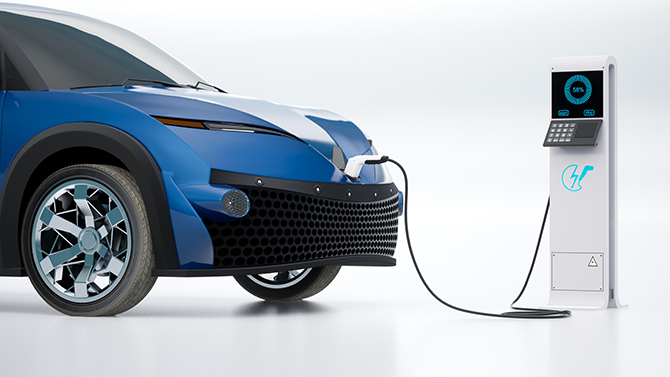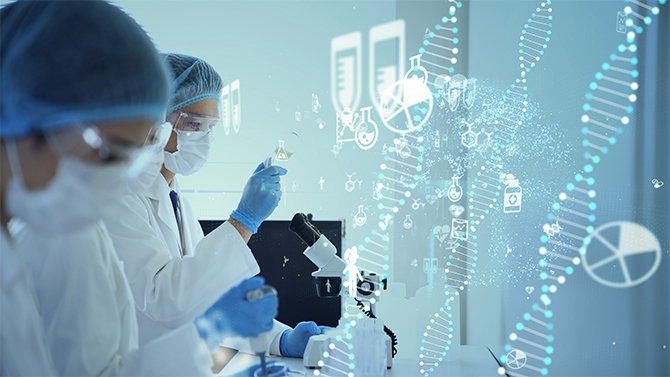Social Issues addressed by Sumitomo —Compass for the Future—
Multifaceted support for decarbonizing social infrastructure
Compact, high-efficiency substation equipment with excellent environmental performance
 Decarbonization
DecarbonizationFocusing on its Power Supply and Environment System Business, Nissin Electric manufactures and sells electrical equipment and apparatus and also performs associated engineering work. The company’s products and services fulfill vital roles in social infrastructure, such as power grids, factories, transportation, and water treatment. For electricity infrastructure, ensuring safe and secure supply of electricity has traditionally been the top priority. In line with the increasing need to address the SDGs, however, it has also become essential to use less electricity and use it wisely. In the Power Supply and Environment System Business, Nissin Electric is offering multifaceted support in response to this changing environment.
Seizing the initiative, Nissin Electric is addressing social issues by offer solutions dubbed “Smart Power Supply Systems (SPSS).” The company’s objective in promoting SPSS is fourfold: expansion of environmentally friendly products, response to distributed energy, response to renewable energy, and application of digital transformation (DX) to products and business. By transitioning from a business model focused on conventional equipment sales to one centering on provision of systems and solutions integrating control technology, software, and networks, the company is endeavoring to resolve energy-related issues.
SPSS comprises five types of solutions: SPSS-Factory to address issues of factories and office buildings related to electric power, SPSS-Water to facilitate energy saving and efficient use of resources at water treatment facilities, SPSS-Grid for power plants and substations to ensure stable power supply and grid stabilization, SPSS-Island for energy management on remote islands and for microgrids, and SPSS-Home for energy optimization in the home. Whereas SPSS-Grid is a solution for the energy supply side, the other four are solutions designed to resolve issues on the demand side.

SPSS-Factory for factories and office buildings accounts for a large share of Nissin Electric’s revenue from SPSS. Factories increasingly use extra-high-voltage electricity of 60,000 to 70,000 volts as a countermeasure for rising energy costs as well as a way of advancing toward carbon neutrality by reducing CO2 emissions. Nissin Electric, with a leading market share for extra-high-voltage substation systems, offers environmentally friendly systems that help manufacturers address such issues.

With respect to substation systems, Nissin Electric already sells the A (Advanced)-XAE substation, a next-generation compact substation. The A-XAE substation has a small footprint, can be installed quickly, and is environmentally friendly. Compared with the conventional XAE substation, the A-XAE substation achieves a 25% reduction in installation space, a 27% reduction in the number of days required for on-site construction, and a 13.5% reduction in CO2 emissions during substation construction. As well as reducing environmental impacts during construction, the A-XAE substation offers higher efficiency with less loss, contributing to lower running costs and energy saving. Going forward, the company intends to launch and promote an environmentally friendly substation system with even better environmental credentials.


Several technological breakthroughs have an important bearing on progress in the environmental friendliness of substation systems. Firstly, improvement of the efficiency of transformers, which convert the extra high voltage received to a voltage usable in factories. A certain level of loss is inevitable with transformers, resulting in wasteful power consumption on a daily basis. Nissin Electric has developed and commercialized super high efficiency transformers with reduced losses by applying novel materials and devising ingenious structures. For example, if a 10MVA transformer of a model introduced 30 years ago is replaced with a super high efficiency transformer, Nissin Electric estimates that the loss can be halved and CO2 emissions can be drastically reduced from 144 tons to 71 tons. Since transformers are used for several decades and infrequently replaced, replacing them with super high efficiency transformers as soon as possible will lead to lower environmental impacts for many years to come.
In addition, reduction of the loss of power capacitors used in substations will contribute to lower costs and cut CO2 emissions. Other measures include changing the insulating oil in transformers from mineral oil to plant-derived oil that is biodegradable so that even if leakage occurs, the environmental impact is minimal.
SPSS-Factory also enables efficient utilization of renewable energy, such as photovoltaic power. Storage batteries are used to efficiently utilize the power generated by photovoltaic power generation systems installed in factories and other facilities. Surplus power generated in good weather and on holidays is stored for use when needed. Moreover, SPSS-Factory enables power wheeling, which is flexible distribution of electricity among sites. Nissin Electric’s long-cultivated expertise in energy management makes all the difference. The company is also promoting the application of AI for photovoltaic power generation supply/demand forecasting, optimized control of various power supply facilities, and control of water quality in water treatment.

Nissin Electric has formulated the Medium-to-Long-Term Business Plan “VISION 2025” with a view to achieving carbon neutrality by 2050. In this plan, the company has set its vision for 2050 and created the roadmap by backcasting from the goal. SPSS’s solutions reflect a similar approach. Nissin Electric endeavors to deliver the optimum solutions while identifying customer needs, including improved energy efficiency and greater use of renewables.


Read about initiatives to achieve a low-carbon society, aiming at net-zero greenhouse gas emissions since these emissions are implicated in global warming.

In view of ongoing globalization and the growing complexity of supply chains, companies need to respond appropriately to issues in supply chains.

The pace of workstyle reform is accelerating as the COVID-19 pandemic has prompted numerous companies to embrace novel ways of working.

For companies, the COVID-19 pandemic has brought the crucial importance of employee health into sharp focus.

Accelerating global warming poses serious business risks. Accordingly, companies need to formulate strategies and implement specific countermeasures from a medium- to long-term perspective.

Spurred by efforts to reduce environmental impacts and in line with increasing social needs, replacement of gasoline-powered vehicles with electric vehicles is accelerating.

Vigorous initiatives are afoot to tackle social issues by revitalizing communities and the interpersonal relationships that bind them together.

Poverty persists in contemporary Japan and the existence of child poverty is a grave concern.

In view of the continuing decline of Japan’s working age population, due to population aging coupled with a low birthrate, development of the next generation is an urgent issue.

The rapid progress in medicine in recent years is largely due to the efforts of not only universities and other research institutions but also of companies to develop cutting-edge technologies.

Numerous initiatives to promote industry and commerce at the regional and community level are underway, involving the use of renewable energy and thus contributing to decarbonization.

One-third of food produced is lost or wasted globally, amounting to about 1.3 billion tons per year. Food loss and waste is a pressing issue in need of a solution.

Companies are addressing a wide range of issues so that people and companies can coexist in harmony with the global environment.

In addition to natural disasters, there are various types of hazards whose nature, incidence and severity are changing with the times. Resilience and flexibility are indispensable in dealing with them.

Read about initiatives to achieve sustainable regional revitalization. The attributes and resources that each region can offer are leveraged to strengthen local economies and overcome the problem of population decline.